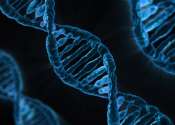Researchers identify role that skin plays in Zika virus
When a mosquito infected with Zika virus bites someone, the skin is the first line of defense against infection.
Apr 3, 2020
0
134
When a mosquito infected with Zika virus bites someone, the skin is the first line of defense against infection.
Apr 3, 2020
0
134

When brains begin developing, there are a lot of moving parts—and when mutations happen in early neurodevelopment, it can lead to disorders like macrocephaly and autism. But scientists don't know much about the ways that ...
Mar 11, 2020
0
86

The microscopic populations of bacteria in our intestines are, in some ways, just like us: They live in communities, eat, work, reproduce, and eventually die. Many of these bacterial species live in harmony with our bodies, ...
Mar 11, 2020
0
182

When immunologist Dr. Wei Cao joined Baylor College of Medicine three-and-a-half years ago, her first project was to investigate how inflammation contributes to Alzheimer's disease.
Mar 5, 2020
0
158

Using "BPA-free" plastic products could be as harmful to human health—including a developing brain—as those products that contain the controversial chemical, suggest scientists in a new study led by the University of ...
Feb 18, 2020
3
580

A UCLA-led study reveals a new role for a gene that's associated with autism spectrum disorder, intellectual disability and language impairment.
Feb 12, 2020
0
321

Not everyone who catches Ebola dies of the hemorrhagic virus infection. Some people mount a robust immune defense and recover fully. Yet risk factors for susceptibility to infection and disease severity remain poorly understood.
Feb 11, 2020
0
21

A key mechanism underlying neuronal dysfunction in Angelman syndrome (AS), a syndromic form of autism spectrum disorder, has—for the first time—been revealed through innovative research led by Duke-NUS Medical School ...
Jan 15, 2020
0
182

If pregnant women take significant amounts of the psychostimulants coffee, nicotine and amphetamine during pregnancy, their children have a higher risk of developing neurological and psychiatric problems later in life. Researchers ...
Dec 4, 2019
0
766

1.7 million. That's how many people are infected with the human immunodeficiency virus (HIV) each year worldwide. 1.7 million people who are condemned to lifelong antiretroviral therapy (ART) or risk developing fatal AIDS ...
Nov 26, 2019
2
55
